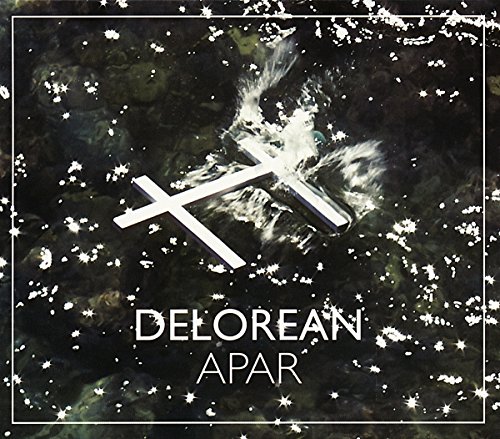
Delorean
Apar
Release Date: Sep 10, 2013
Genre(s): Electronic, Pop/Rock, Alternative/Indie Rock, Indie Electronic, Dream Pop, Alternative Dance
Record label: True Panther Sounds
Music Critic Score
How the Music Critic Score works
Buy Apar from Amazon
Album Review: Apar by Delorean
Fairly Good, Based on 11 Critics
Based on rating 8/10
Despite the three-year gap between the release of 2010's Subiza and 2013's Apar, it sounds like the Spanish pop-electronic combo Delorean never took a break from recording. Apar is just as dream-inducingly lush and layered as Subiza, which was very lush and layered indeed. As before, the band take the best parts from the baggy dance styles of the '90s, add shimmering dream pop textures, bleepy bedroom techno electronics, and candy-sweet indie pop melodies sung by Ekhi Lopetegi in a very heartfelt whisper, then whip it up into a light-as-air confection that's sweeter than super-sugary candy.
Based on rating 4
Spanish quartet Delorean have always been adept at creating glistening and evocative dance music that fits with the seasons. Their last album, 2010’s Subiza, was very much a record of heady dance floor euphoria. Its Balearic charms did much to bring the band to a wider audience and it’s with that wider audience that they seek to engage further on fourth album Apar.
Based on rating 7.4/10
Meet the calmer, more measured Delorean. The band who once named an EP after a legendary race car driver has chosen to name their third album after a Basque word for "froth," sending thousands of music journalists scrambling to find a synonym for "froth." (Recommended: "spindrift.") After three years of touring on Subiza's resplendent builds and easy choruses, the band returned to Barcelona and built a studio for themselves. Terms like "analog production" have been tossed around, and the band has replaced their feel-good sampledelia with Actual Female Vocalists, including contributions from Chairlift's Caroline Polachek and Glasser.
Based on rating 3.5/5
Balearic dream-weavers Delorean have being dealing with crises of varying magnitude since 2010’s ‘Subiza’. Both personal heartbreaks and the Spanish economic crash are frontline concerns on latest album ‘Apar’ (meaning ‘froth’ in Basque), but this is no weary, introverted or battle-beaten album. “There’s no turning back from this” is the optimistic call to arms on ‘Destitute Times’, as they try to build a danceable future on the rubble of ruin.
Based on rating 6/10
Barcelona's Delorean appeared like a warm, unexpected summer breeze when their debut LP, Subiza, dropped in March 2010. The album's unflappable, Balearic sound experienced a zeitgeist moment, evoking the feel-good vibe that was sweeping international clubs. Over the last three years, however, the quartet have had a bumpy ride, falling victim to Spain's economic crisis, as well as a romantic one for singer/lyricist/bassist Ekhi Lopeteg.
Based on rating 5/10
Delorean take their name from either an anachronistic or time-traveling car. Maybe both. Which is ostensibly weird only because the band insists on crafting music that transcends time, dragging synthesizer slams from a John Hughes movie onto a futuristic beach in Catalonia. Two albums ago, on the EP, Ayrton Senna, that garnered them relative fame in the United States, Delorean chose a title that paid homage, or maybe paid nothing, to the deceased Formula 1 driver of the same name.
Based on rating 4.5/10
Has dreamy synthpop outstayed its welcome? Four years have passed since chillwave first infected the pixelated pages of blog-land, when the likes of Washed Out, Neon Indian, and Memory Tapes lassoed listeners with their aerated grooves. But each act has stood still since, unable to progress from the period's bliss-heavy effects and honeycomb melodies. .
Based on rating C-
What happens when a band abandons something tried, true, and unique for something more pop focused and “accessible”? The answer, usually, is a whole heap of disillusionment. The case, however, for Delorean’s Apar is a bit more complicated. On Apar, the Barcelona-based, English-driven alternative dance group renounces what made Into the Plateau and Subiza so rhythmically moving.
Opinion: Very Good
Delorean, Balearic beat merchants from Spain’s northern Basque region, are returning to the realm of LPs with their new full-length effort, Apar, the first record since 2010?s Subiza. Currently based in the coastal cultural hub of Barcelona, the Iberian foursome have built a career on superb sun-frenched alt. pop in the vein of Crystal Fighters or El Guincho, inciting frivolity and blissed-out entranced dancing across the globe – they may seem like the perfect OST to lollygagging en la playa, but after a few listens, you’ll feel like leaping into the night full of sangria with an itch to cut shapes.
Opinion: Very Good
‘Apar’, the fourth studio album from Spaniards Delorean is like being superimposed on to a rippling sunset. It’s an exotic, green-screen-daydream of a record that oozes vibrancy - unsurprising, considering that prismatically colourful synths, floaty hooks and intense happiness have been the dance quartet’s stock-in-trade since their Millennium-year inception. Much like ‘Subiza’, which made the noise that Animal Collective might have had they been forcibly instructed to score a particularly hedonistic series of ITV2’s ‘Magaluf Weekender’, ‘Apar’ is brilliantly consistent.
Opinion: Satisfactory
opinion byISAAC BUCKLEY On Apar, the follow up to 2010’s Subiza, the members of Delorean opted to move towards live instrumentation and away from the computer-based recording process of their previous work. Gone too are the sampled and pitch-shifted vocals found on Subiza, instead the band worked with live vocalists to craft what frontman Ekhi Lopetegi referred to as their “big production album. ” Apar starts strong with its first track, the lead single “Spirit.
'Apar'
is available now

